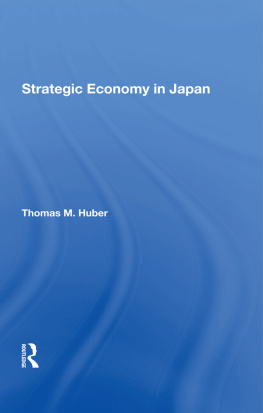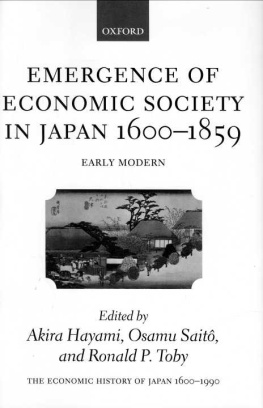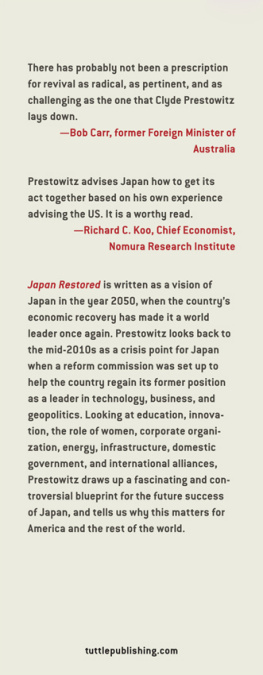JAPAN: RESTLESS COMPETITOR
Japan: Restless Competitor
THE PURSUIT OF ECONOMIC NATIONALISM
Malcolm Trevor
Japan: Restless Competitor
First published in 2001 by Japan Library
This edition published 2013 by Routledge
2 Park Square, Milton Park, Abingdon, Oxon 0X14 4RN
711 Third Avenue, New York, NY 10017
Routledge is an imprint of the Taylor & Francis Group, an informa business
Malcolm Trevor 2001
All rights reserved. No part of this publication may be reproduced, stored in a retrieval system, or transmitted in any form or by any means, without prior permission from the Publishers in writing except for the use of short extracts in criticism.
British Library Cataloguing in Publication Data
A CIP catalogue entry for this book is available from the British Library
ISBN 1903350026
D r Malcolm Trevor has had a long and distinguished career. I first met him when I was in Tokyo as a member of a European Parliament delegation and he was the European General Manager for the EU-Japan Centre for Industrial Cooperation. This was a post that gave him a close insight into the political and business outlook of our Japanese friends and I believe his comprehensive account deserves to be relayed to a much wider audience.
It carries a message which any wise foreign businessman seeking to win out in Japan would be wise to take on board. Inevitably, people from outside Japan will have a range of impressions. But there can be no getting away from the fact that the climate of opinion in Japan is very different from that in, say, Western Europe or North America. The Japanese have a large population for the size of their islands and their culture has remained largely unchanged over the years. At the same time, their politico-economic system is quite different from Adam Smiths concept and any foreigner who has had to make a living in Japan is made quickly aware of that. Efforts by outsiders to alter the equation have to a very large extent been resisted, though it is just possible that the current financial crisis is beginning to rock the previously solid state of Japan.
As a Member of the European Parliament from 1979 to 1999, and as the Rapporteur for the Parliament for most of that period on trade and economic relations between the EU and Japan, I warmly recommend this book which is a truly remarkable piece of work, reflecting as it does the personal experience of Dr Trevor, both in Europe and Japan, and his skilful comparison of the two systems which are not readily compatible.
James Moorhouse, MEP 19791999
S oon after arriving in Japan for the first time in late 1962, I was introduced to an old English teacher and long-term resident in the country. For something to say, I remarked that he must have seen many changes. Nothings changed, he replied. Obviously he found the question on the part of a newcomer nave, though I was not in fact new to Asia.
To know whether or how far Japan has changed from its recent past, or even a more distant past, is something that anyone engaged in business or political relations and negotiations with the Japanese needs to know. Without such knowledge they will be easily misled and will risk making mistakes that will be hard to put right, with all that this implies for their organizations and themselves.
The problem concerns both the complex interrelations of political and business relations on the Japanese side and our own shortcomings in terms of awareness of what is at stake. Consequently this book concentrates on six main points:-

That in talking about Japanese business activity, we are not simply dealing with a free market or private enterprise economic system but with a politico-economic system in which business and politics are inseparable. The building industry cartel, employing eleven per cent of all employees, which rigs bids among its members, funnels large sums of money to politicians and several of whose top managers are related by marriage with leading political figures, is one such example. Most people had little difficulty in recognizing that in the former USSR trade, or business, was subservient to political aims but, while the Japanese system is not the same, despite certain similarities, a surprising number of people still believe that Japanese business and politics are quite separate.

That Japans problems after the bursting of the bubble economy and the banking crisis are again leading people who should know better to underestimate its resilience and the other strengths it has. Japan will be back. Equally it should not be overestimated, as it was only a few years ago.

That in Europe, USA and elsewhere there is still a dangerous ignorance of the realities of Japans politico-economic system and how it operates, especially at the top decision making levels. This is despite the progressive penetration of European, American and world markets since the 1960s and the increase in overall Japanese economic control through their share of export markets and direct investment in manufacturing and services internationally.

That images of Japan as a representative parliamentary democracy, with an internationalist foreign policy, are considerably exaggerated (how long does it take for parliamentary democracy to take root against a background of authoritarian rule stretching back over the centuries?) This particularly applies to images fostered by Japanese officials for foreign consumption and those with either a fleeting experience on short trips, or most likely no first-hand experience of living and working in Japan at all in situations in the business or political field where they would have to confront the hard realities behind the nice rhetoric. As Shigeru Yoshida, Japans first post-war prime minister put it, History provides examples of winning by diplomacy after losing a war.
Naturally it is difficult for many people in more open liberal democracies to realize the means that Japanese officialdom has in terms of control over information, money for red-carpet trips to Japan etc., at its disposal for winning friends and influencing people. While at home many people distrust what politicians and officials say, or what they read in the newspapers, some suspend their normal scepticism in regard to anything to do with Japan; which is a great help to those putting out the official party line. In short, are we dealing with a new Japan: or is it really the old Japan with a few cosmetic and superficial changes concealing what is underneath? Without a knowledge of Japans past it is impossible to decide. Anyone who believes that history is bunk in the case of such an old society as Japans is seriously deluding themselves.











 That in talking about Japanese business activity, we are not simply dealing with a free market or private enterprise economic system but with a politico-economic system in which business and politics are inseparable. The building industry cartel, employing eleven per cent of all employees, which rigs bids among its members, funnels large sums of money to politicians and several of whose top managers are related by marriage with leading political figures, is one such example. Most people had little difficulty in recognizing that in the former USSR trade, or business, was subservient to political aims but, while the Japanese system is not the same, despite certain similarities, a surprising number of people still believe that Japanese business and politics are quite separate.
That in talking about Japanese business activity, we are not simply dealing with a free market or private enterprise economic system but with a politico-economic system in which business and politics are inseparable. The building industry cartel, employing eleven per cent of all employees, which rigs bids among its members, funnels large sums of money to politicians and several of whose top managers are related by marriage with leading political figures, is one such example. Most people had little difficulty in recognizing that in the former USSR trade, or business, was subservient to political aims but, while the Japanese system is not the same, despite certain similarities, a surprising number of people still believe that Japanese business and politics are quite separate. That Japans problems after the bursting of the bubble economy and the banking crisis are again leading people who should know better to underestimate its resilience and the other strengths it has. Japan will be back. Equally it should not be overestimated, as it was only a few years ago.
That Japans problems after the bursting of the bubble economy and the banking crisis are again leading people who should know better to underestimate its resilience and the other strengths it has. Japan will be back. Equally it should not be overestimated, as it was only a few years ago. That in Europe, USA and elsewhere there is still a dangerous ignorance of the realities of Japans politico-economic system and how it operates, especially at the top decision making levels. This is despite the progressive penetration of European, American and world markets since the 1960s and the increase in overall Japanese economic control through their share of export markets and direct investment in manufacturing and services internationally.
That in Europe, USA and elsewhere there is still a dangerous ignorance of the realities of Japans politico-economic system and how it operates, especially at the top decision making levels. This is despite the progressive penetration of European, American and world markets since the 1960s and the increase in overall Japanese economic control through their share of export markets and direct investment in manufacturing and services internationally. That images of Japan as a representative parliamentary democracy, with an internationalist foreign policy, are considerably exaggerated (how long does it take for parliamentary democracy to take root against a background of authoritarian rule stretching back over the centuries?) This particularly applies to images fostered by Japanese officials for foreign consumption and those with either a fleeting experience on short trips, or most likely no first-hand experience of living and working in Japan at all in situations in the business or political field where they would have to confront the hard realities behind the nice rhetoric. As Shigeru Yoshida, Japans first post-war prime minister put it, History provides examples of winning by diplomacy after losing a war.
That images of Japan as a representative parliamentary democracy, with an internationalist foreign policy, are considerably exaggerated (how long does it take for parliamentary democracy to take root against a background of authoritarian rule stretching back over the centuries?) This particularly applies to images fostered by Japanese officials for foreign consumption and those with either a fleeting experience on short trips, or most likely no first-hand experience of living and working in Japan at all in situations in the business or political field where they would have to confront the hard realities behind the nice rhetoric. As Shigeru Yoshida, Japans first post-war prime minister put it, History provides examples of winning by diplomacy after losing a war.